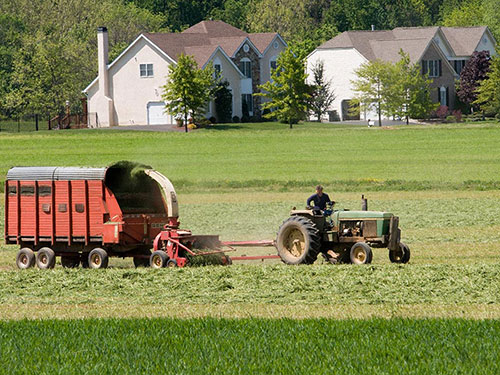
Fact Sheet FS1253
As New Jersey's population has grown, farmers and neighbors have been brought closer together. Some aspects of this growth are very positive, as farmers are able to cultivate new markets closer to home, and consumers are able to access fresh, locally-produced agricultural products. Other aspects are more challenging, however, as the needs of farm businesses sometimes conflict with new residential and commercial neighbors, as well as municipal and county regulations. To help resolve such issues, the Right to Farm Act (N.J.S.A. 4:1C-1 et seq.) was signed into law in 1983.
Every state in the country has its own version of Right to Farm. In New Jersey, the Right to Farm Act is primarily designed to help address conflicts between farmers, neighbors, and municipalities regarding a farm's practices. Anyone aggrieved by the operation of a commercial farm is required to file a complaint with the County Agriculture Development Board (CADB) prior to filing an action in court. This is what makes New Jersey's Right to Farm Act so strong - commercial farms cannot be taken to court by neighbors and local governments before complaints are heard by either the CADB or State Agriculture Development Committee (SADC). These agencies have special expertise in the agricultural industry and understand the needs of farm operations.
Under the Act, responsible commercial farms that meet the Act's eligibility criteria can receive significant protections from nuisance lawsuits and overly restrictive local regulations. Case law has upheld these protections, while affirming that CADBs and the SADC must exercise discretion when making Right to Farm determinations, so that everyone's interests are considered and public health and safety are protected.
Coordination
Right to Farm is coordinated locally by New Jersey's 18 CADBs. When a person has a question or concern about Right to Farm, he or she can contact the CADB administrator for more information. Should a farmer, neighbor, or municipality wish to initiate one of the Right to Farm Act's formal review processes, they would contact the CADB to start the process. In the three counties without CADBs - Essex, Hudson, and Union - the SADC should be contacted directly.
Eligibility
A farm must meet the Right to Farm Act's criteria for qualifying as a "commercial farm" in order to be eligible for Right to Farm protection. A "commercial farm" is a farm operation of five or more acres that produces agricultural products worth at least $2,500 annually and that satisfies the eligibility criteria for farmland assessment. For commercial farms smaller than five acres, the annual production requirement is $50,000, and the farm must otherwise satisfy the eligibility criteria (aside from the size requirement) for farmland assessment. A commercial farm can also be a beekeeping operation that produces apiary-related products or provides crop pollination services worth at least $10,000 annually. A commercial farm may comprise multiple parcels, whether contiguous or non-contiguous, provided they are operated together as a single enterprise. This is the farm's "farm management unit."
To be eligible for protection, the commercial farm must also meet the following criteria:
- The commercial farm must be located in a zone that as of December 31, 1997 or thereafter permits agriculture, or must have been in operation as of July 2, 1998.
- The commercial farm operation (practices, activities, or structures) must:
- Conform to generally-accepted agricultural management practices,
- Comply with all relevant federal or state statutes and regulations, and
- Not pose a direct threat to public health and safety.
Protected Activities
The Act's list of protectable activities is set forth in N.J.S.A. 4:1C-9. Broadly speaking, these activities involve producing, processing, and marketing the agricultural output of the commercial farm. Commercial farms that meet the Act's eligibility criteria may be entitled to receive Right to Farm protection for these activities, subject to a formal determination from the CADB or SADC.
The Act also permits the SADC to add to the list of protected agricultural activities through the formal rule-making process.
| Protected Agricultural Activities (per the New Jersey Right to Farm Act, N.J.S.A. 4:1C-9) | |
|---|---|
| Producing | |
| Processing | |
| Marketing | |
| Other | |
Formal Review Processes
The Right to Farm Act establishes two formal processes through which CADBs can make official Right to Farm determinations: (1) a complaint process that neighbors and municipalities can initiate, and (2) a site-specific request process that farmers can initiate. The outcome of each process is an official CADB decision regarding whether the farm is entitled to Right to Farm Act protection.
Complaint Process
Under the Act's formal complaint process, anyone aggrieved by the operation of a commercial farm is required to file a complaint with the CADB prior to filing an action in court. This means that neighbors who have a nuisance complaint, and municipal officials who believe a farm is violating an ordinance, must file a complaint with the CADB rather than filing a lawsuit in court or issuing a zoning violation or summons. This aspect of Right to Farm, that CADBs have primary jurisdiction to review and decide agriculture-related disputes, has been upheld by the courts in numerous cases.
After receiving a written complaint, the CADB begins by reviewing whether the farm meets the definition of commercial farm, whether the farm meets the Act's locational eligibility provision, and whether the activity in question is included in the list of protectable activities set forth in N.J.S.A. 4:1C-9. If these criteria are met, the CADB - or the SADC depending on the nature of the complaint - holds a public hearing and issues its decision in the form of a resolution. This decision can protect the farm's activities that are the subject of the complaint, protect the activities in part, or deny Right to Farm protection, based on the specific details of the case. Anyone aggrieved by the CADB's decision may appeal it to the SADC, and anyone aggrieved by the SADC's decision may appeal it to the New Jersey Superior Court, Appellate Division.
Site-Specific Agricultural Management Practice Process
Under the site-specific agricultural management practice (AMP) process, a commercial farm may proactively request that the CADB determine whether its specific operation or practices conform to generally-accepted practices. The purpose of a farm's site-specific AMP request might be to address a current issue with a neighbor or municipality, or it might be to establish, for the future, that the farm's practices are generally-accepted and entitled to Right to Farm Act protection. When a CADB receives a request for a site-specific AMP determination, it follows a process similar to the one for formal complaints. It reviews whether the Act's eligibility criteria are met, holds a public hearing, and issues its decision in the form of a resolution, which may be appealed to the SADC. To ensure that everyone's interests are considered, the site-specific AMP process requires that the farm notify various public bodies and individuals about the public hearing, including the municipality and all property owners within 200 feet of the farm.
Preemption and the Balancing of Interests
The Right to Farm Act can protect responsible commercial farms from nuisance lawsuits and restrictive local regulations. A common question that follows is: What does this mean in practice when an issue arises?
Neighbor Complaints
If a matter involves a formal complaint submitted by a neighbor, and if the CADB (and the SADC, if the CADB's decision is appealed) finds that the farm is following generally-accepted practices and is entitled to protection, then the final decision establishes an "irrebuttable presumption" that the farm's activities do not constitute a public or private nuisance. On the other hand, if the CADB (and the SADC, if the CADB's decision is appealed) finds that the farm is not following generally-accepted practices and is not eligible for protection, the farm would not be shielded from subsequent nuisance lawsuits. In all cases, CADBs must consider the impact of the farm's practices on surrounding property owners.
Municipal Complaints
In certain cases, Right to Farm protection can preempt municipal ordinances, meaning the farm does not have to follow certain regulations, e.g., local zoning standards. This preemption of local regulations is one possible outcome when a formal complaint or a site-specific AMP request involves the issue of compliance with local standards. In these cases, the CADB must seek the municipality's input during the public hearing process. The New Jersey Supreme Court has held that when rendering decisions, CADBs and the SADC must consider relevant municipal standards and impacts to affected property owners, appropriately balance competing interests, and consider the impact of agricultural practices on public health and safety. CADBs and the SADC address preemption of local ordinances on a case-by-case basis, and for preemption to occur, a commercial farm must provide a legitimate, agriculturally-based reason for not complying with the local standards.
Agricultural Management Practices (AMPs)
To be eligible for Right to Farm protection, a commercial farm must comply with agricultural management practices (AMPs) that are either generally accepted or have been formally adopted by the SADC through the rule-making process. The SADC has adopted AMPs in 12 areas to clarify the standards for Right to Farm protection:
- Apiaries
- Poultry manure
- Food processing by-product land application
- Commercial vegetable production
- Commercial tree fruit production
- Natural resource conservation
- On-farm composting operations
- Fencing installation for wildlife control
- Aquaculture
- Equine activities
- On-farm direct marketing
- Solar energy generation facilities
If a formal Right to Farm matter involves activities not addressed by an adopted AMP (or by a site-specific AMP determination), the CADB or SADC will determine whether the activities in question constitute generally accepted practices. In all cases, a farm's activities must be consistent with the standards set forth in any adopted AMPs in order to receive Right to Farm protection.
Agricultural Mediation
As an alternative to the formal Right to Farm processes, the SADC coordinates a free Agricultural Mediation Program to help farmers, neighbors, and municipalities resolve agriculture-related disputes quickly, amicably, and in a cost-effective manner. Mediation is an entirely voluntary process in which a trained, impartial mediator serves as a facilitator to help the parties examine their issues, identify and consider options, and determine if they can agree on a solution. A mediator has no decision-making authority, so successful mediation is based on the cooperation and participation of all the parties. For more information or to request mediation, parties should contact the SADC.
Common Questions and Answers
Every Right to Farm Act inquiry or formal case is different and requires a case-by-case consideration. The following are some frequently asked questions.
For More Information
The County Agriculture Development Boards and State Agriculture Development Committee are the best points of contact if you have questions about the Right to Farm Act and the Agricultural Mediation Program. For additional information on generally-accepted agricultural practices, Rutgers Cooperation Extension county agricultural agents are a good resource.
County Agriculture Development Boards (CADBs)
http://nj.gov/agriculture/sadc/farmpreserve/contacts/cadbs.html
State Agriculture Development Committee (SADC)
http://www.nj.gov/agriculture/sadc
Rutgers Cooperative Extension
http://njaes.rutgers.edu/county
April 2016
Copyright © 2025 Rutgers, The State University of New Jersey. All rights reserved.
For more information: njaes.rutgers.edu.
Cooperating Agencies: Rutgers, The State University of New Jersey, U.S. Department of Agriculture, and Boards of County Commissioners. Rutgers Cooperative Extension, a unit of the Rutgers New Jersey Agricultural Experiment Station, is an equal opportunity program provider and employer.



